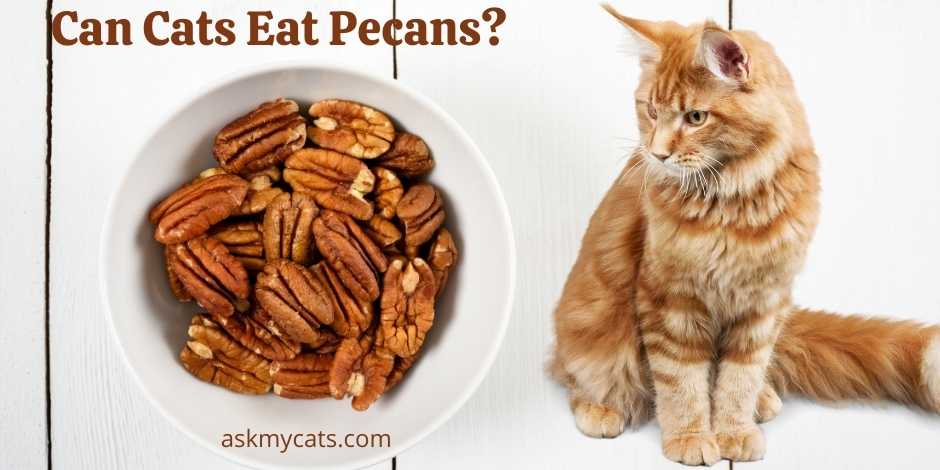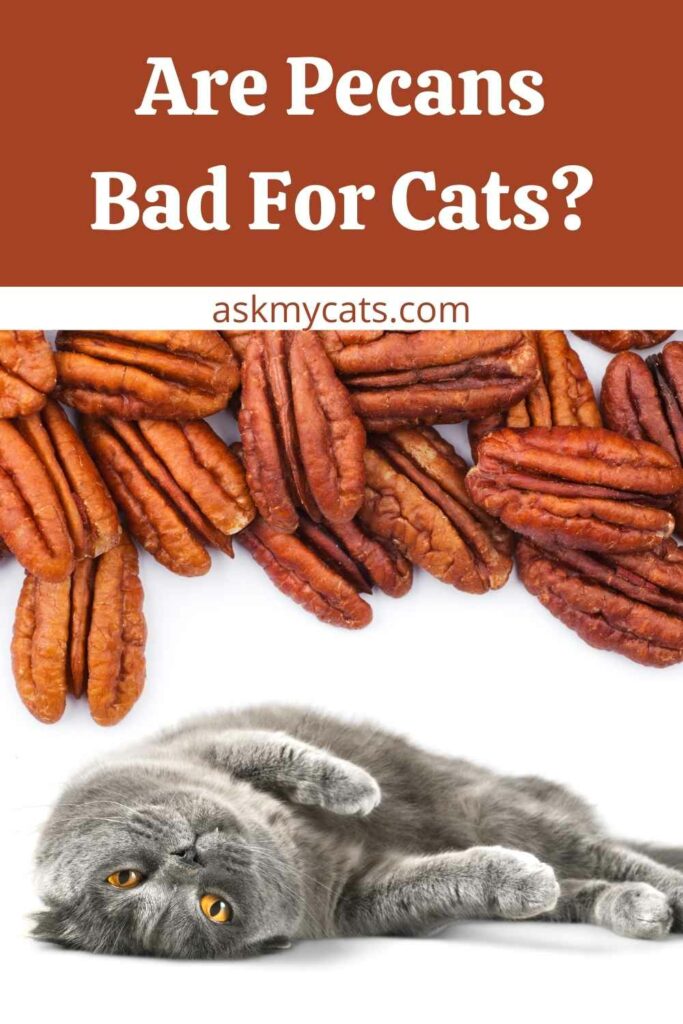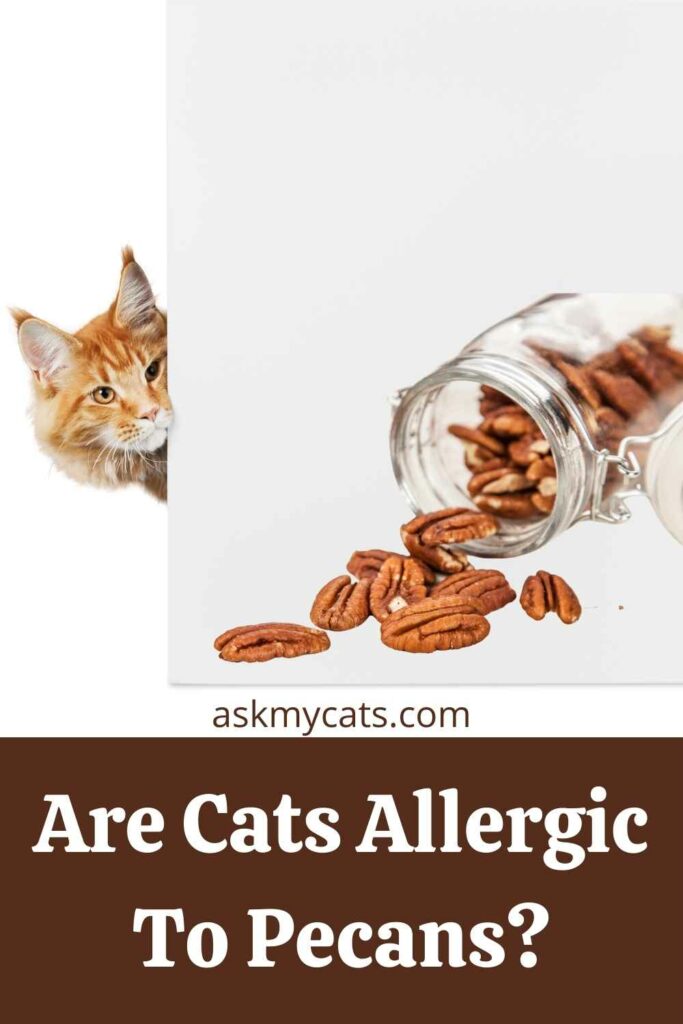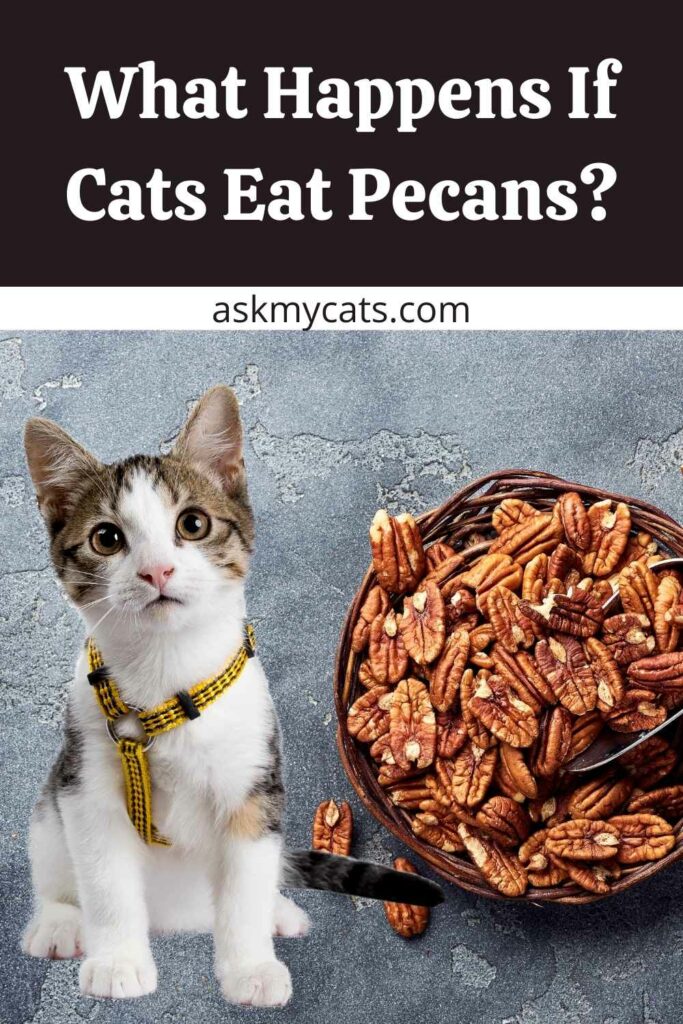Pecans are a type of nut produced by Hickory trees and are native to the south-central areas of Mexico and the United States. Pecan is an Algonquin term that refers to nuts that require a stone to crack open.
Pecans are similar to walnuts in appearance. They do, however, seem smoother, longer, and slenderer than walnuts. Pecan shells are also less difficult to break than walnut shells.
Pecans are safe for cats to consume. Pecans are not harmful to cats, so if your cat eats a handful of these delightful nuts, he or she is unlikely to suffer any long-term consequences. That isn’t to say they shouldn’t eat pecans.
Continue reading the article for more information.


Give Your Cat the Perfect Day
Get the Free Ebook!
Are Pecans Bad For Cats?
A small amount of pecans can be fed to your cat since it’s not bad for them.

While cats can consume pecans without experiencing too many negative consequences, they should definitely avoid doing so.
Pecans, for example, are strong in omega-3 fatty acids, which are good for giving structure to cell membranes and delivering energy to your pet’s body. However, these nuts may be difficult for your cat to digest, resulting in stomach distress, vomiting, or diarrhoea.
Of course, high-fat diets can contribute to obesity and other problems like pancreatitis and renal failure, so you’ll want to make sure your cat doesn’t consume too many pecans or other nuts.
We eat nuts as snacks and utilise them in a variety of dishes on a daily basis. Nuts come in many varieties, and we enjoy them all for their distinct flavours and health advantages.
Humans can stomach nuts since they are omnivores, but cats will have difficulties digesting anything other than meat and meat products. Although nuts are considered to be beneficial to humans, the high fat level in them might be hazardous to your cat.
Even the quantity of salt we regularly put to our daily meal might be too much sodium for your cat. These days, the shops are loaded with varied nuts, such as roasted nuts, salted nuts, and so on.
What is typical for people will be excessive for your cat, since salt poisoning is a severe concern that we must consider before feeding cats anything.
Feeding pecan nuts or any other potentially dangerous nuts to your cat is not a good idea. As long as your cat isn’t allergic to it, once in a while should enough. Even if you eat one or two pecan nuts by accident, you’ll be alright.
There are a plethora of goodies designed just for your feline companion on the market. If you want to reward your cat for being a nice cat, the best thing you can do is look for alternative treats that are both healthy and pleasurable.
These cunning felines are cheeky and cunning, but it is your obligation as their owner to ensure that your cat has a long and healthy life.
What you feed your cat determines its happiness and health. The greatest approach to keep your cat safe is to keep food away from them that might affect their health. You should also provide your pet a meal that has a good balance of proteins and vitamins.
Keep the food out of your cat’s reach. If you have an inquisitive cat, you should secure your cabinet with cat-proof locks.
Make sure your cat isn’t on top of the counter or table when you’re cooking or dining.
Instead of table scraps, offer them cat chow that has been particularly formulated for them.
When you have visitors around, make sure they don’t feed your cat any sweets or cakes that contain nuts.
If you detect or suspect any strange behaviour in your cat, take it to the local veterinarian right once. Your cat must have eaten something poisonous at the moment, and you may need to get to the veterinarian.
Some human foods may cause little discomfort in your cat, while others are significantly more harmful than you may think.
Are Cats Allergic To Pecans?
Your cat might have a pecan allergy, which is quite unusual.

If your cat has a response to pecans or any other food, you should consult your veterinarian.
Itching and skin sores, as well as severe vomiting and diarrhoea, are common signs that your pet has a food allergy.
Most cats are not allergic to pecans. Some cats will be allergic to it and will exhibit symptoms such as vomiting, diarrhoea, and hotspots. If your cat exhibits any of these symptoms after eating pecans, be especially cautious not to allow it access the nuts. Pecans are only effective if your cat consumes them.
Another disadvantage of giving pecans to your cat is that they contain a lot of fat, which is unhealthy for daily intake. In most circumstances, pecan nuts aren’t harmful to cats, however doctors highly advise against feeding them. Pecans can promote obesity in cats, as well as pancreatitis and renal failure in severe situations.
Kidney failure and pancreatitis are severe illnesses for cats since they will not recover, especially in the case of senior cats. You should not give your cat any food that might be harmful to its health.
Since every cat is different, some may develop an allergy to pecans while others may not.
Nut allergies can appear in a variety of ways, but the most typical symptoms include rash, vomiting, and itching. If your cats are allergic to pecans, you may notice them sneezing, itching of the ears and head.
Because these symptoms are so similar to those of common feline illnesses, it will be difficult for you to distinguish between them.
The only method to detect them is to seek for situations that cause the digestive system to react. The safest option would be to take her to the vet!
The most common feline allergies are food allergies. The simplest way to screen for allergies in your cat is to adjust his or her diet.
Because many commercial pet foods include such a diverse assortment of ingredients, the doctor will most likely recommend switching to a new protein or hypoallergenic diet.
What Happens If Cats Eat Pecans?
Nothing will happen if your cat eats a handful of pecans because pecans are not poisonous to cats.

This means they’re great at giving your pet’s cell membranes shape and supplying energy to their body.
Pecans in moderation or by mistake will not damage your cat, but you should constantly be aware of the potential negative effects, since they may be difficult for them to digest. They can cause allergies and, in severe situations, diarrhoea.
What important in both circumstances is that these delightful walnut-like nuts are edible for cats, but only in very little amounts.
The majority of the cats will survive the trial, but some may develop allergies as a result. The pecans are more concerned with business than with animal welfare.
You won’t be able to do much if your cat ate a lot of pecan nuts or is allergic to them. The best advice is to make your cat drink a lot of water or use a syringe to administer fluids to your cat. Take your pet to the vet right away. Don’t be alarmed if your cat vomits on the way. However, if you prolong the condition, even the best veterinarians will be unable to save your cat.
There is a greater likelihood of acquiring a major risk if they are ingested in bigger doses.
In extreme circumstances, less common symptoms such as sudden heaviness that might lead to pancreatitis or renal failure have been observed.
Kidney failure and pancreatitis are severe illnesses for cats, as they are unable to recover. That is why, especially in the case of senior felines, you should strive to avoid giving them anything that might harm their health.
Is Pecan Pie Safe For Cats?
Pecan pie contains artificial sugars in it so you should avoid offering your cats pecan pie.
If your cat has indigestion in a considerable amount, you should take him to the veterinarian right away. In severe situations, immediate heaviness, pancreatitis, or renal failure might occur.
Pecan pies contain a lot of oil in them, which means fats, which are bad for our cats’ health! Excessive oil consumption will make it harder for her to digest, resulting in problems such as vomiting and diarrhoea.
It also has a significant danger of making your cat fat. As a result, the question of how many pecans are too much for cats is irrelevant.
Can Cats Eat Roasted Pecans?
Yes, your cat can eat roasted pecans.
Although heated to eliminate some of the oils that cause digestive problems in cats, roasted pecans still contain more fat and calories than other cat foods.
Pecans are not poisonous to cats, but eating too many can make them sick.
Roasted pecans should only be offered as a special treat and in modest quantities.
Can A Cat Have Butter Pecan Ice Cream?
No, your cat must not eat butter pecan ice cream.
In big concentrations, it can be harmful. Basically, you may offer your cat a teaspoon of ice cream as a special treat.
A few things can happen if ice cream becomes an everyday meal item. The most serious problem is diarrhoea, which is likely to occur if too much of the treat is taken.
Frequently Asked Questions
Can Diabetic Cats Eat Pecans?
Yes. Pecans have a low glycemic index, so they won’t increase your blood sugar.
Can Cats Eat Pecan Shells?
The rough shells of pecans can be risky to chew or swallow for kittens and elderly cats, especially if you buy them whole rather than cutting them yourself. If taken whole, the shells might induce intestinal blockage or choking.
Are Pecans Safe For Overweight Cats?
Pecans are not typically safe for overweight cats due to their high calorie content. They should only be given in little doses and seldom as a treat.
Final Words
While pecans are unlikely to harm your cat, if ingested in excess, they can cause health problems and, in a rare number of cases, induce a minor allergic response.
While cats may eat pecans, it is not a good idea to serve them to them or leave them laying around in places where they could be found by your cat.
Leave your questions in the comments section below.
